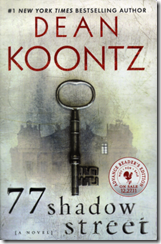 In case you haven’t noticed I think about Copyright. Author’s rights. Libraries’ rights. Purchasing vs. accessing. Is copying theft or not. I read about these topics. I think about these topics. I blog and speak about these topics. I don’t want to sound like I’m obsessed, but it’s something that’s important to me as both a librarian and an author.
In case you haven’t noticed I think about Copyright. Author’s rights. Libraries’ rights. Purchasing vs. accessing. Is copying theft or not. I read about these topics. I think about these topics. I blog and speak about these topics. I don’t want to sound like I’m obsessed, but it’s something that’s important to me as both a librarian and an author.
But now, it’s starting to creep into my everyday life. For example, this morning I was reading an Advance Reader’s Edition of the next Dean Koontz novel 77 Shadow Street. Very earl in the novel I can across the following paragraph:
Blandon was one of the Jerks. He belonged in jail, but he bought his freedom by loading up on attorneys in five-thousand-dollar suits. No doubt he had also threatened to take half his political party down with him if they didn’t put their hands up the backsides of their puppet prosecutors and puppet judges to ensure that the Muppet show called justice would follow the plot he preferred.
Instead of enjoying the image of a lawyer as human Muppet I immediately thought "hey, Muppet is a trademarked term (I think). Did he have to get permission to use that? Even if he didn’t have to, did he anyway?” (Ok, technically this isn’t a copyright issue, it’s a trademark issue, but close enough to make my point.)
Sure, it’s probably fair use. But is this a Kleenex vs. facial tissue sort of situation? A Muppet is a type of puppet. Did Dean need to be that specific? If Disney sued and he changed it to “puppet” to settle the suit, would that change the metaphor? Should I be writing Muppet™ every time just to cover myself.
Oh, and let’s not forget that this is a edition of a book that clearly states “NOT FOR SALE” on the cover yet I purchased it on eBay. Sure, right of first sale and all, but is that statement on the cover an implicit license to the original owner of this copy? Did they ask for it then resell it, or was it given to them by the publisher unrequested. (Yes, that has actually made a difference in some first sale doctrine court cases.) Oh, and did you know that even though the first sale doctrine most likely applies to selling this copy, you can’t sell one on Amazon? (Their site, their rules, but I’m sure it’s because they don’t want to piss off the publishers, legal or not.)
I guess my point is that copyright in this country has gotten so complex that it just doesn’t necessarily make sense, as applied, any more. All of this makes me think of something I recently heard Cory Doctorow say which I’ll need to paraphrase as I can’t find the actual quote:
Copyright is like banking regulation. Sure we need to regulate banks and those large transactions but that doesn’t mean those regulations should kick in if I want to borrow five dollars from a friend.
Yes, copyright has it’s place but industrial grade regulations shouldn’t necessarily apply to the individual. If for no other reason that it’s starting to make my brain hurt.
This has come up before in Talking Books. We’ve recorded two fiction books by a certain Nebraska author who felt compelled to put the copyright symbol beside every iteration of brand-name products in his books–and he makes references to products a LOT in his prose. Our normal process includes recording every word in a printed text, including the symbols, but in the case of these books, there were so many of them that it would have completely destroyed any sense of narrative, so we made a special readers note listing the many, many, many products for which he included a copyright symbol, and then ommitted them from the rest of the text during narration.
At the time, I had looked around to verify that copyright acknowledgement isn’t necessary in fiction, and ultimately, it’s not. This blog post lays out the issue nicely: http://www.rightsofwriters.com/2010/12/can-i-mention-brand-name-products-in-my.html